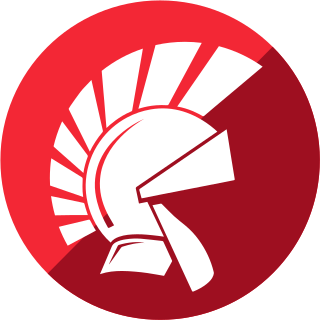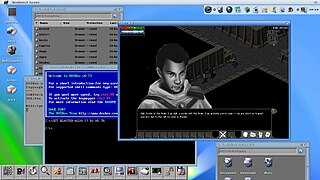An integrated development environment (IDE) is a software application that provides comprehensive facilities for software development. An IDE normally consists of at least a source-code editor, build automation tools, and a debugger. Some IDEs, such as IntelliJ IDEA, Eclipse and Lazarus contain the necessary compiler, interpreter or both; others, such as SharpDevelop and NetBeans, do not.
In computing, cross-platform software is computer software that is designed to work in several computing platforms. Some cross-platform software requires a separate build for each platform, but some can be directly run on any platform without special preparation, being written in an interpreted language or compiled to portable bytecode for which the interpreters or run-time packages are common or standard components of all supported platforms.
Amiga E is a programming language created by Wouter van Oortmerssen on the Amiga computer. The work on the language started in 1991 and was first released in 1993. The original incarnation of Amiga E was being developed until 1997, when the popularity of the Amiga platform dropped significantly after the bankruptcy of Amiga intellectual property owner Escom AG.

KDevelop is a free and open-source integrated development environment (IDE) for Unix-like computer operating systems and Windows. It provides editing, navigation and debugging features for several programming languages, and integration with build automation and version-control systems, using a plugin-based architecture.
MorphOS is an AmigaOS-like computer operating system (OS). It is a mixed proprietary and open source OS produced for the Pegasos PowerPC (PPC) processor based computer, PowerUP accelerator equipped Amiga computers, and a series of Freescale development boards that use the Genesi firmware, including the Efika and mobileGT. Since MorphOS 2.4, Apple's Mac mini G4 is supported as well, and with the release of MorphOS 2.5 and MorphOS 2.6 the eMac and Power Mac G4 models are respectively supported. The release of MorphOS 3.2 added limited support for Power Mac G5. The core, based on the Quark microkernel, is proprietary, although several libraries and other parts are open source, such as the Ambient desktop.

wxWidgets is a widget toolkit and tools library for creating graphical user interfaces (GUIs) for cross-platform applications. wxWidgets enables a program's GUI code to compile and run on several computer platforms with no significant code changes. A wide choice of compilers and other tools to use with wxWidgets facilitates development of sophisticated applications. wxWidgets supports a comprehensive range of popular operating systems and graphical libraries, both proprietary and free.

Delphi is a general-purpose programming language and a software product that uses the Delphi dialect of the Object Pascal programming language and provides an integrated development environment (IDE) for rapid application development of desktop, mobile, web, and console software, currently developed and maintained by Embarcadero Technologies.
Borland C++ was a C and C++ IDE released by Borland for MS-DOS and Microsoft Windows. It was the successor to Turbo C++ and included a better debugger, the Turbo Debugger, which was written in protected mode DOS.
CygnusEd is a text editor for the AmigaOS and MorphOS. It was first developed in 1986-1987 by Bruce Dawson, Colin Fox and Steve LaRocque who were working for CygnusSoft Software. It was the first Amiga text editor with an undo/redo feature and one of the first Amiga programs that had an AREXX scripting port by which it was possible to integrate the editor with AREXX enabled C compilers and build a semi-integrated development environment. Many Amiga programmers grew up with CygnusEd and a considerable part of the Amiga software library was created with CygnusEd. It is still one of very few text editors that support jerkyless soft scrolling.

AmigaOS 4 is a line of Amiga operating systems which runs on PowerPC microprocessors. It is mainly based on AmigaOS 3.1 source code developed by Commodore, and partially on version 3.9 developed by Haage & Partner. "The Final Update" was released on 24 December 2006 after five years of development by the Belgian company Hyperion Entertainment under license from Amiga, Inc. for AmigaOne registered users.

AROS Research Operating System is a free and open-source multi media centric implementation of the AmigaOS 3.1 application programming interface (API) which is designed to be portable and flexible. As of 2021, ports are available for personal computers (PCs) based on x86 and PowerPC, in native and hosted flavors, with other architectures in development. In a show of full circle development, AROS has been ported to the Motorola 68000 series (m68k) based Amiga 1200, and there is also an ARM port for the Raspberry Pi series.

MonoDevelop was an open-source integrated development environment for Linux, macOS, and Windows. Its primary focus is development of projects that use Mono and .NET Framework. MonoDevelop integrates features similar to those of NetBeans and Microsoft Visual Studio, such as automatic code completion, source control, a graphical user interface (GUI), and Web designer. MonoDevelop integrates a Gtk# GUI designer called Stetic. It supports Boo, C, C++, C#, CIL, D, F#, Java, Oxygene, Vala, JavaScript, TypeScript, and Visual Basic.NET. Although there is no word from the developers that it has been discontinued, nonetheless, it hasn't been updated in 4 years and is no longer installable on major operating systems, such as Ubuntu 22.04 and above. Its parent Microsoft seems to have shifted focus to Visual Studio Code and the .NET Framework, which runs on many operating systems, including Linux.
This article deals with productivity software created for the Amiga line of computers and covers the AmigaOS operating system and its derivatives AROS and MorphOS. It is a split of the main article, Amiga software.

Hollywood is a commercially distributed programming language developed by Andreas Falkenhahn which mainly focuses on the creation of multimedia-oriented applications. Hollywood is available for AmigaOS, MorphOS, WarpOS, AROS, Windows, macOS, Linux, Android, and iOS. Hollywood has an inbuilt cross compiler that can automatically save executables for all platforms supported by the software. The generated executables are completely stand-alone and do not have any external dependencies, so they can also be started from a USB flash drive. An optional add-on also allows users to compile projects into APK files.
This article deals with programming languages used in the Amiga line of computers, running the AmigaOS operating system and its derivatives AROS and MorphOS. It is a split of the main article Amiga software. See also related articles Amiga productivity software, Amiga music software, Amiga Internet and communications software and Amiga support and maintenance software for other information regarding software that runs on Amiga.
Mbed is a development platform and operating system for internet-connected devices based on 32-bit ARM Cortex-M microcontrollers. The project is collaboratively developed by Arm and its technology partners.

A new version of AmigaOS was released on December 24, 2006 after five years of development by Hyperion Entertainment (Belgium) under license from Amiga, Inc. for AmigaOne registered users.

The Xojo programming environment and programming language is developed and commercially marketed by Xojo, Inc. of Austin, Texas for software development targeting macOS, Microsoft Windows, Linux, iOS, Android, the Web and Raspberry Pi. Xojo uses a proprietary object-oriented language.
Absoft Fortran Compilers are set of Fortran compilers for Microsoft Windows, Apple Macintosh, and Linux produced by Absoft Corporation. The compilers are source code compatible across platforms.







